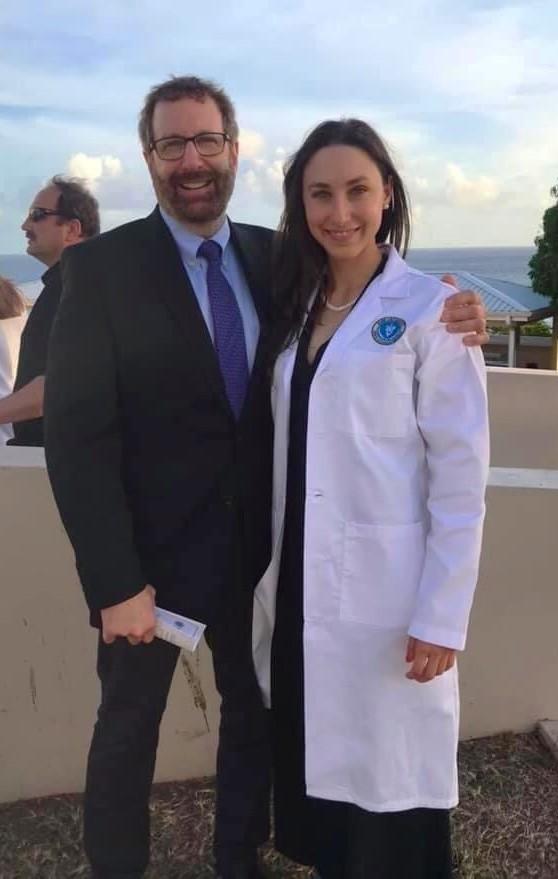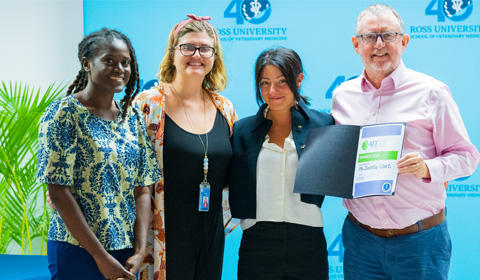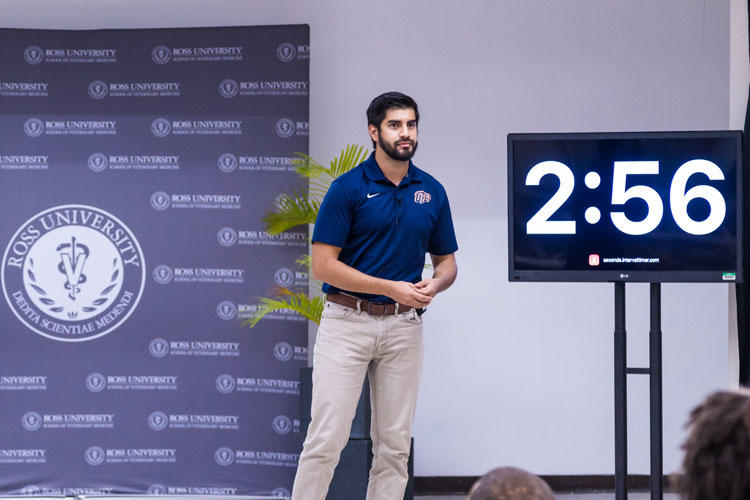In the race for the cure—or a way to slow the COVID-19 spread—some veterinary researchers are exploring whether man’s best friend can assist. The pandemic has brought a critical awareness to zoonotic diseases and has strengthened the bond between the animal and human worlds. “Veterinary medicine enriches human medicine with the use of animals and a broad understanding of pathogens,” said an impassioned Ross University School of Veterinary Medicine student, Alex Fontanetta. “We’ve known for a long time that dogs sometimes have the ability to sense when something is wrong in a human, and they’re already frequently trained to help diagnose and monitor other human diseases. Imagine the incredible ways dogs could potentially help with COVID.”
Alex’s dad, John Fontanetta, MD, is a physician and chair of emergency medicine at a New Jersey medical center who’s helped with the overload of COVID patients from New York. “One of the most important things for understanding and preventing zoonotic infections and human pandemics is to figure out where they’re coming from; we know this virus started in the animal kingdom and that it mutated and is now affecting humans. I’m encouraged by how the vet and human medical communities are working together to understand this virus and manage its spread. And the dog potential is just fascinating. Dogs can sniff cancer, malaria and Parkinson’s. I don’t know if they smell a pathogen or the body’s response to the pathogen, but they have amazing success. We could really use them to help us now, especially since one of the biggest challenges with COVID is accurate and speedy testing.”
Finishing her fourth semester, Alex is a firm believer in Ross Vet’s One Health program, which focuses on understanding the interconnectivity between the health of humans, animals and the environment. “We’re trying to make medicine a more holistic field, and one way we’re hoping to do that is by creating a closer relationship between the veterinary and human medicinal communities.” The possibility of COVID-sniffing dogs, which are now being tested by researchers at an East coast veterinary school, thrills Alex. “Dogs are remarkable creatures and their senses reach a whole different level.” If effective, these trained dogs could mirror the efforts of canines who now conduct airport screenings for explosives and illegal drugs.
Hoping Dogs Can Sniff Out the Virus
“It would be invaluable if dogs were able to screen patients before they entered the hospital, so we could quickly isolate someone who was infected with the virus from non-COVID patients,” John said, with Alex adding, “dogs have been able to successfully sniff out things like seizures and changes in blood sugar; now it’s just a matter of seeing if dogs can identify people infected with COVID and how reliably they can do so. If successful, experts predict dogs could screen 250 people an hour. It would be a game changer especially since some of our biggest issues right now revolve around our testing limitations.”
Many logistical factors also need to be considered for this trial phase:
- Time needed to train the dogs
- How to acquire human COVID samples at every stage—mild, moderate, severe and those who are asymptomatic
- Special foster families to house dogs after they are exposed to the virus during training
Raised in a dual-physician household, Alex always knew veterinary medicine was her calling. She studied physics and psychology in college and started as a pharmacy tech and health facilities manager in the human world. “I’ve always loved health and science but after doing a lot of different things pertaining to those subjects, I realized a component was still missing—animals. Human medicine didn’t resonate with me; the animal aspect was missing. Animals were involved in everything I did as a kid and becoming a vet was a way to marry my worlds together.”
Veterinarians Teaming with Physicians
When the coronavirus first hit a few months ago, Alex reached out to veterinary hospitals to see if they would donate their personal protective equipment to her father’s hospital. “It was nice to see how the veterinary community stepped up knowing how hard of a time we were having,” John said.
At his hospital, which is a few miles outside of New York, John said he had never seen the facility so overrun with patients. “We usually have 22 patients in the ICU and at our peak, we had over 80. We had to convert anesthesia machines to ventilators,” John recalled. “Then, as shelter-in-place and social distancing measures began to flatten the curve, things finally started getting better. And the community, as always, has continued to be supportive.”
John knows a second COVID-19 outbreak is potentially on the horizon and he is braced for impact. “There are lot of potential treatments and therapies for this virus being researched. Hopefully, some of those treatments will prove successful. In the meantime, we just have to remain ready for another potential spike in cases. We don’t necessarily have to cure the disease; we have to slow it down enough in the early stages to give the body a chance to fight.”
Meanwhile, Alex is ready to bring their worlds together. “We have to continue to educate the public on all aspects of this pandemic, including the animal and veterinary components, not just about the things pertaining directly to human medicine. Due to factors of modern living, we are now at a greater risk for epidemics and pandemics than ever before. We need to find ways as a united medical community to bridge the gap between animal and human medicine because people forget—viruses are invisible enemies that attack both sides and, more often than not, the deadliest human diseases come to us from animals.”
Appreciative and Thankful
We appreciate your commitment to the continued well-being of our Ross Vet community and support during this unprecedented time. Please visit the Ross Vet website for the latest updates regarding COVID-19.







